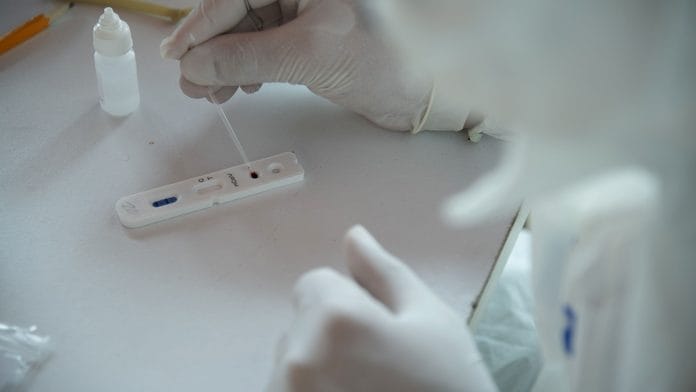New Delhi: Even as the death toll from the SARS-CoV-2 continues to rise across the world, scientist are racing to find ways to fight the disease.
Here are some of the latest scientific developments around the novel coronavirus.
Heart cell therapy shows promise in Covid-19 patients
An experimental cell therapy, which involves injecting lab grown heart cells in patients, helped four of six critically ill Covid-19 patients to recover from the infection.
The therapy is designed to reduce excess inflammation, a major cause of death in Covid-19 infections.
However, the researchers from Cedars-Sinai Medical Center in US cautioned that while the patient outcomes are encouraging, the findings are not enough to prove that the therapy is safe and effective for treating Covid-19.
The therapeutic, known as CAP-1002, contains cardiosphere-derived cells (CDCs) that are grown in the laboratory from human heart tissues. Earlier studies on this therapeutic indicated that the CDCs, originally created by a process developed to treat heart failure, can help the whole body.
The case series, published in the scientific journal Basic Research in Cardiology Wednesday, describes the outcome of six patients who suffered from respiratory failure and required supplemental oxygen before receiving the cell therapy.
Of these, five were on ventilators. Four patients were able to breathe without respiratory support within four days of the therapy, and in less than three weeks, they were discharged from the the hospital.
Two other patients, however, were still hospitalised at the end of the study period.
Also read: ICMR to conduct community-based survey in 69 districts to assess Covid exposure
Antidepressant to be tested on Covid-19 patients
An antidepressant medication is being tested as a potential treatment for Covid-19, after scientists found that it may prevent dangerous overreactions by the immune system.
Researchers at US’ Washington University in St. Louis are launching a clinical trial to determine if the drug fluvoxamine can prevent “cytokine storms”, where the body is flooded with proteins due to an overactive immune response.
This immune response can lead to life-threatening organ failure and has been a major concern in Covid-19 patients.
Last year, researchers from University of Virginia in US had found that the drug fluvoxamine may stop the deadly inflammation known as sepsis, where the immune response spirals out of control. The drug proved effective in mice as a preventative treatment for sepsis, and now it will be tested as a protective measure for patients with Covid-19.
For the trial, fluvoxamine will be tested in 152 patients with the infection. The patients will receive either fluvoxamine or a placebo while quarantined at home.
Using thermometers, fingertip oxygen sensors and automatic blood pressure monitors provided to them, the participants will report their oxygen levels and other vital signs to the research team everyday.
According to the researchers, since the drug has been around for decades, it can be used safely.
Also read: Why men are more vulnerable to coronavirus than women
Clinical trial to test experimental drug senicapoc
Scientists are conducting a clinical trial in Aarhus University in Denmark to assess whether senicapoc — an experimental drug developed to treat sickle cell anaemia — can prevent lung damage in Covid-19 patients and reduce the number of days spent on a ventilator.
Although senicapoc was found safe in clinical trials, it did not reduce the number of sickle-cell crises and was shelved as a result.
Researchers at University of California, Davis in US had been evaluating senicapoc as a potential treatment for stroke and Alzheimer’s disease.
The team found that the drug is able to block fluid secretions in the lungs and mitigate the overreaction of the immune system. These effects together may be able inhibit the development of severe acute respiratory syndrome (SARS) and damage to the lungs.
The clinical trial in Denmark will evaluate 46 patients in intensive care with low blood oxygen saturation levels. The team hopes to share the study results in a few months.
Study reveals healthcare staff may be infected with Covid-19 without realising it
A survey of the UK’s NHS hospital staff indicates that many of them may be carrying SARS-CoV-2 without realising they are infected.
The study by researchers at the University of Cambridge shows that even if healthcare workers wear appropriate PPEs, hospitals need to be vigilant and introduce screening programmes across their workforces.
The team swabbed and tested over 1,200 NHS staff in the UK throughout April and the staff members were asked about relevant coronavirus symptoms.
Out of more than 1,000 staff members reporting fit for duty during the study period, 3 per cent tested positive for coronavirus. On closer questioning, around one in five reported having no symptoms, two in five had very mild symptoms that they had dismissed as inconsequential and a further two in five reported Covid-19 symptoms that had stopped more than a week earlier.
The researchers recommend that healthcare staff be routinely tested even if they do not report any symptoms to prevent further spread of the virus.
Also read: Covid tests are pretty accurate, but not perfect, a molecular biologist explains






